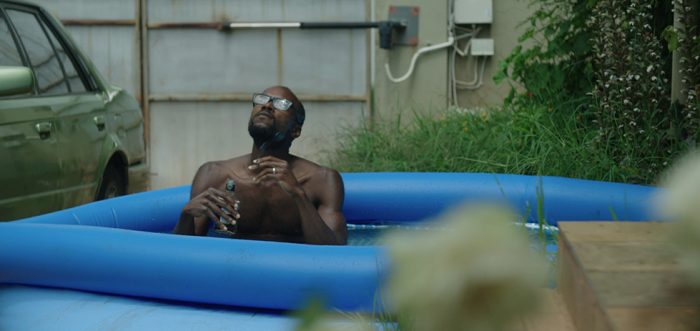
Cuckold, from South African director/writer Charlie Vundla, is a quiet exploration of masculinities in domesticity, prompting discussions about gender, race, intimacy and relationships. Vundla himself plays Smanga, a young paleoanthropologist referred to as “the youngest black professor in South Africa”. As a result of his infertility, he has been abandoned by his wife Laura (Terry Pheto) for another man. The film opens in the aftermath of this: Smanga’s descent into violence, addiction, and sexual indulgence. At a bar, he encounters an old white schoolmate, Jon (Louis Roux), who is a homeless life coach. Smanga takes him in and in return, Jon nurtures Smanga, encouraging him to heal and move on, whilst also helping him secure his house in the face of repossession. Laura’s sudden return to the house complicates and heightens the intimacy between the three of them, the film arriving at a point of catharsis.
Before this denouement, we’re offered some real moments of peace, especially between Smanga and Jon. Sharing food, joints, smiles and after a while, women, Cuckold latches onto the ambiguity in male friendship, navigating the vulnerability of dependency amidst heartbreak and destitution. The absence of a musical score forces the viewer to pay attention to the nuances of their body language as it echoes through domestic space. It also deadens the sporadic acts of violence, rendering them performative rather than passionate, despite the apparent emotional causes behind them. By the end of the film, each character has wounded another in some way; their “rock bottom” selves scramble to find some semblance of control, inevitably prioritising themselves despite expressing a simultaneous desire to care for one another. The progression in the framing of the characters throughout Cuckold mirrors this – Vundla’s participation in the film bolsters the protagonist’s physical and emotional vulnerability, and the camera follows his body in private moments, lending the narrative some sense of authenticity.
Race and racism is mentioned but does not explicitly frame the interactions between Smanga, Laura and Jon. It is notable to see an intimate portrayal of black life coexisting with whiteness—directed by a black man—without explicit reference to interpersonal racial dynamics, and without a clear thesis to take away. Smanga’s emotional preoccupation with security — of worth, of home, of wife, of future, of legacy — hints at an implicit disconnect with Jon’s eternal optimism, which is in spite of having nothing to his name. The role Jon takes in Smanga’s life is also quietly subversive in a way: feeding him, disarming him (literally and figuratively), and ardently committing to him. It almost reads as an inverse of the ‘magic Negro’ stereotype until the film’s final scenes complicate Jon’s benevolence, with more shots of Jon from afar, shifting towards a growing suspicion and tension It is hard to comment further without knowing the specific ways race operates in post-apartheid South Africa.1
Cuckold finally submits to a type of anti-happy ending, where lessons have been learnt, truths have been unveiled and compromises made. Though many of these crises have the same root — male entitlement and insecurity — Vundla only takes the characters to the beginning of changing their behaviour, without modelling a lot of the healing or growth that would take its place. I felt that was shown in Laura’s position, the woman used to reflect back the masculinity of each male character through being controlled, abused or upheld. Cuckold does not fall entirely into the common pitfall of the female love object serving as male growth vessel, but also does not steer completely clear from that, as Laura’s character is not deepened despite her centrality. Can a film explore masculinity without reference to its continual rejection of femininity and without reinscribing masculine traits with patriarchal value? Cuckold does depict these traits and their consequences on human connection and security but does not go to lengths to show alternatives, nor dig deeper. Vundla leaves the characters in a tranquil mess, but still moving, living questions without clear answers. As a self-financed addition to the growing independent cinema in South Africa, Vundla’s work contributes to nuanced representation of South African life, espousing a self-baring, humanising approach to film direction.
